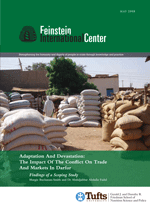Conflict and crisis in Darfur has continued unabated since 2003. While there has been a growing body of knowledge about how this has impacted on livelihoods, there has been much less focus on understanding how trade and markets – the lifeblood of Darfur’s economy – have been affected.
This report begins to address this gap between livelihoods research and the crisis’ effects on trade and markets. Part of Tufts University’s livelihoods research program in Darfur, it provides an overview of how trade in cereals, livestock, cash crops and timber have been impacted. It reveals a crippling policy environment in which traders are struggling to meet an escalating tax burden and to pay the numerous informal levies and protection payments that are now an integral part of trading transactions. This is pushing a growing proportion of trade into the shadow or parallel economy, in which the de facto tax havens in the IDP camps play a part. There is also evidence of war economies developing, for example in timber. Yet the report confirms that a positive by-product of the massive humanitarian food aid operation in Darfur has been the shoring up of the grain market. Meanwhile the market infrastructure for cash crops such as groundnuts, tombak and gum arabic has suffered near collapse. Livestock trading is also under severe stress. Not surprisingly many traders have gone out of business as profit margins are severely squeezed. This scoping study proposes a number of follow-up market-related activities to support livelihoods programming, and ways of strengthening market monitoring – an essential indicator of the state of Darfur’s economy and its ability to recover when peace is restored. A deeper understanding of trading relationships also provides valuable insights into the dynamics of the conflict itself.







